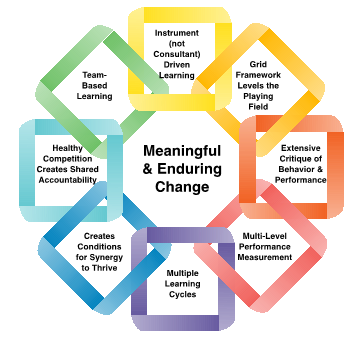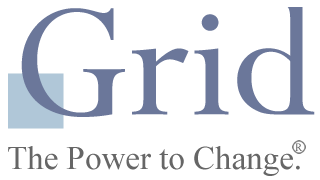

Universal Imperatives – a Basis for Change
The Grid methodology and its learning designs build on a fundamental imperative: the desire in each and every one of us to have strong relationships based on mutual trust and to make a sound contribution through work. Consider the following fundamental desires that we all have:

We want to be led…but not to be controlled

We want to be inspired…but not to be manipulated

We want to make an individual contribution… but also to be part of a larger community that adds purpose and significance to our lives.
There are four reasons for Grid’s effectiveness as a truly powerful learning methodology

Employees, as team members, are responsible for their own solutions. Grid places responsibility for change on the employees and therefore motivates them to develop and maximize their personal resources in constructive ways to help one another.

The learning process is experiential and fun! 90 percent of Grid team activities take place in teams. The spirit of competition that arises within and across teams is as enjoyable as any game of organized sport.

Teams operate under their own guidance, without a formal, external consultant to supervise or direct their learning. As a result, teams find themselves making collective decisions, grappling with time issues, resolving differences between members, and facing other choices and responsibilities, together. The challenge of being effective is very real, and the increased reward of success is great, acting as a confidence and morale boosting injection.

Change performance is measured. Individuals and teams learn how to measure the quality and effectiveness of typically intangible behaviors like decision-making, conflict resolution, critique and others. The exclusive measurement process allows each team member to see how effectively he or she contributed to the team outcomes. This insight drives home the understanding of the impact that our behaviors have on results and on other people.
You can think of interdependent culture in terms of a mathematical formula:

Universal Imperatives – a Basis for Change
The Grid methodology and its learning designs build on a fundamental imperative: the desire in each and every one of us to have strong relationships based on mutual trust and to make a sound contribution through work. Consider the following fundamental desires that we all have:

We want to be led…but not to be controlled

We want to be inspired…but not to be manipulated

We want to make an individual contribution… but also to be part of a larger community that adds purpose and significance to our lives.
There are four reasons for Grid’s effectiveness as a truly powerful learning methodology

Employees, as team members, are responsible for their own solutions. Grid places responsibility for change on the employees and therefore motivates them to develop and maximize their personal resources in constructive ways to help one another.

The learning process is experiential and fun! 90 percent of Grid team activities take place in teams. The spirit of competition that arises within and across teams is as enjoyable as any game of organized sport.

Teams operate under their own guidance, without a formal, external consultant to supervise or direct their learning. As a result, teams find themselves making collective decisions, grappling with time issues, resolving differences between members, and facing other choices and responsibilities, together. The challenge of being effective is very real, and the increased reward of success is great, acting as a confidence and morale boosting injection.

Change performance is measured. Individuals and teams learn how to measure the quality and effectiveness of typically intangible behaviors like decision-making, conflict resolution, critique and others. The exclusive measurement process allows each team member to see how effectively he or she contributed to the team outcomes. This insight drives home the understanding of the impact that our behaviors have on results and on other people.
You can think of interdependent culture in terms of a mathematical formula:

Key Learning Components: Candor Skills
Candor skills are used to study evaluate behavior and performance in the same objective terms as more “tangible” performance metrics.
What Candor Is
can·dor
the quality of being open and honest in expression; frankness.
“a man of refreshing candor”
synonyms:
frankness, openness, honesty, candidness, truthfulness, sincerity, forthrightness, directness, plainspokenness, bluntness, straightforwardness, outspokenness; informal telling it like it is
“I’m not sure he appreciated my candor”
What Candor Does
The common denominator for companies that consistently demonstrate excellence is having a culture and relationships deeply rooted in candor.
Without candor, resources get “left on the table” because people don’t speak up, don’t collaborate, don’t manage conflict, work in silos, make poor decisions, to name a few.
The Challenge
Candor is a fundamental skill that is in many ways like learning a new language. Books and training on candor often focus on the “What to do” aspect of candor: that people just need to speak up; be forthright, say what needs to be said when it needs to be said.
It’s not that simple. Have you every tried to “unlearn” how to ride a bicycle?
That’s what candor often requires – having to “unlearn” a deeply entrenched aversion to speaking up.
It’s a skill that works just like a muscle, requiring practice in a safe environment over time. And Grid does just that.
Key Learning Components: Candor Skills
Candor skills are used to study evaluate behavior and performance in the same objective terms as more “tangible” performance metrics.
What Candor Is
can·dor
the quality of being open and honest in expression; frankness.
“a man of refreshing candor”
synonyms:
frankness, openness, honesty, candidness, truthfulness, sincerity, forthrightness, directness, plainspokenness, bluntness, straightforwardness, outspokenness; informal telling it like it is
“I’m not sure he appreciated my candor”
What Candor Does
The common denominator for companies that consistently demonstrate excellence is having a culture and relationships deeply rooted in candor.
Without candor, resources get “left on the table” because people don’t speak up, don’t collaborate, don’t manage conflict, work in silos, make poor decisions, to name a few.
The Challenge
Candor is a fundamental skill that is in many ways like learning a new language. Books and training on candor often focus on the “What to do” aspect of candor: that people just need to speak up; be forthright, say what needs to be said when it needs to be said.
It’s not that simple. Have you every tried to “unlearn” how to ride a bicycle?
That’s what candor often requires – having to “unlearn” a deeply entrenched aversion to speaking up.
It’s a skill that works just like a muscle, requiring practice in a safe environment over time. And Grid does just that.
Characteristics of an Interdependent Culture

Characteristics of an Interdependent Culture

We'd love the opportunity to share our experiences
We draw on the experience of our team globally to help build real plans to move your company to the next level

We'd love the opportunity to share our experiences
We draw on the experience of our team globally to help build real plans to move your company to the next level


